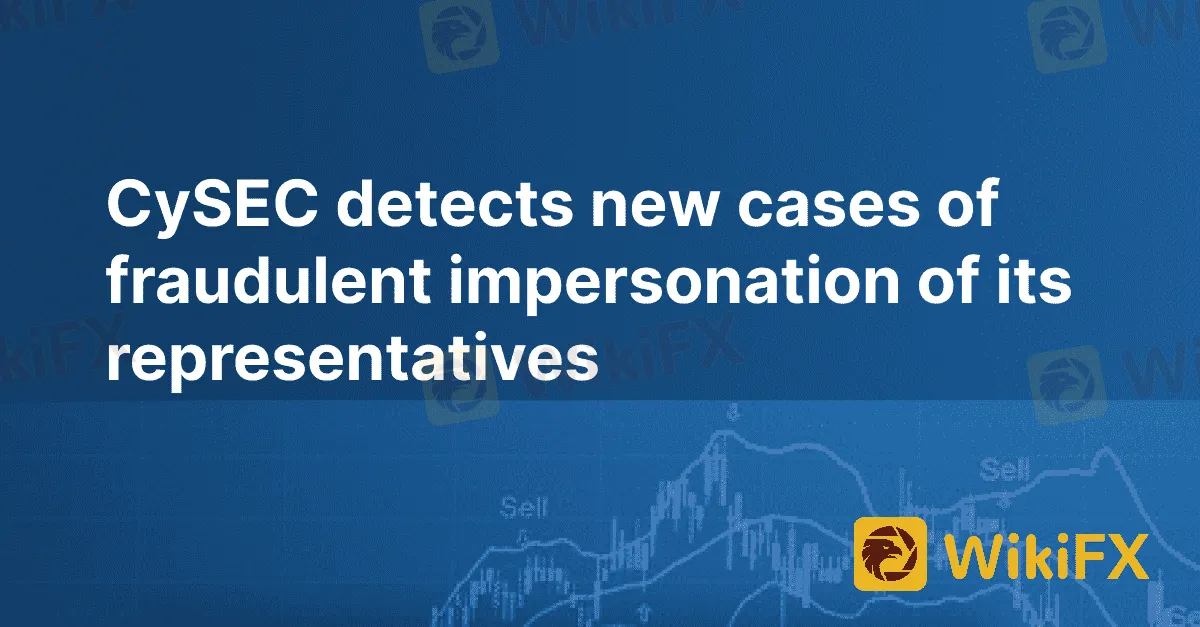简体中文
繁體中文
English
Pусский
日本語
ภาษาไทย
Tiếng Việt
Bahasa Indonesia
Español
हिन्दी
Filippiiniläinen
Français
Deutsch
Português
Türkçe
한국어
العربية
CySEC detects new cases of fraudulent impersonation of its representatives
Abstract: Following the warning issued on November 22, 2022, the Cyprus Securities and Exchange Commission ("CySEC") has recently uncovered additional instances of fraudulent impersonation involving CySEC Officers and Representatives. Investors are advised to exercise heightened caution regarding imposters who request fees in exchange for settling fictitious compensation claims related to firms under CySEC's supervision.

Following the warning issued on November 22, 2022, the Cyprus Securities and Exchange Commission (“CySEC”) has recently uncovered additional instances of fraudulent impersonation involving CySEC Officers and Representatives. Investors are advised to exercise heightened caution regarding imposters who request fees in exchange for settling fictitious compensation claims related to firms under CySEC's supervision.
In light of these developments, CySEC wishes to remind the public that it never initiates telephone calls or sends unsolicited correspondence to investors or members of the general public. Furthermore, CySEC does not request any personal or financial information through such means.
These fraudulent activities are part of a sophisticated online campaign designed to deceive investors. It is crucial for investors to be aware of these scams, which have recently taken on the following patterns:
Fraudsters pose as CySEC officers or representatives, including legal advisors, other Cypriot supervisory authorities, or fictitious entities.
Scammers contact clients of CySEC-regulated entities using emails and/or telephone calls that appear authentic, complete with the genuine telephone number, name, address, official stamp, and CySEC logo. These communications fraudulently mimic the signatures of CySEC officials.
The fraudsters make false promises to assist investors in filing compensation claims related to their interactions with sanctioned firms, typically online trading companies offering speculative investment products.
During these initial interactions, the scammers unlawfully gather additional personal information.
CySEC strongly urges the public to remain vigilant and exercise caution when encountering unsolicited communications that claim to originate from CySEC. It is advised to refrain from providing funds to anyone who approaches them in a manner similar to the examples mentioned above. Investors are strongly encouraged to contact CySEC directly at info@cysec.gov.cy to verify the authenticity of any communication before taking any action.

Disclaimer:
The views in this article only represent the author's personal views, and do not constitute investment advice on this platform. This platform does not guarantee the accuracy, completeness and timeliness of the information in the article, and will not be liable for any loss caused by the use of or reliance on the information in the article.
Read more

Risk Involved with Cabana Capital – Every Trader Should Know
Cabana Capital has changed its name and logo, basically everything about its identity. This seems a bit suspicious, and it's something you should definitely be concerned about. In this article, you’ll learn about the red flags that every trader needs to watch out for.

CME International Records a Massive Jump in Forex Volumes
CME International recorded a record surge in its foreign exchange trading volumes during the second quarter. Check out its performance across products and markets.

Scam Brokers Exposed! FCA Warns Traders to Stay Safe
If you are into forex trading, you need to protect your money from investment scams. Many scam brokers are active in the market now. The FCA, a reputed financial regulator, has issued a list of unlicensed brokers you need to stay away from.

New to Forex Trading in India? Here's How You Can Start and Maximize
Want to begin your forex trading journey in India? Here's a guide that will help you open and close trading positions effectively, resulting in enhanced returns and minimized risks.
WikiFX Broker
Latest News
US Government Interest Grows in Victory Metals’ Rare Earths Supply
How Are Trade Policies Affecting the Aluminum Market?
RM71,000 Lost in a Share Scheme That Never Existed
Scammed by a Click: He Lost RM300,000 in a Month
Manual vs. Automated Forex Trading: Which One Should You Choose?
Revealing Factors That Help Determine the Gold Price in India
Why Regulatory Compliance Is the Secret Ingredient to Trustworthy Forex Brokers
Pentagon to become largest shareholder in rare earth miner MP Materials; shares surge 40%
Delta shares jump 12% after airline reinstates 2025 profit outlook as CEO says bookings stabilized
Delta shares jump 13% after airline reinstates 2025 profit outlook as CEO says bookings stabilized
Currency Calculator


